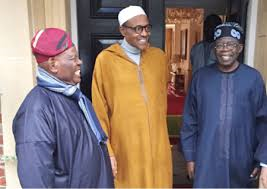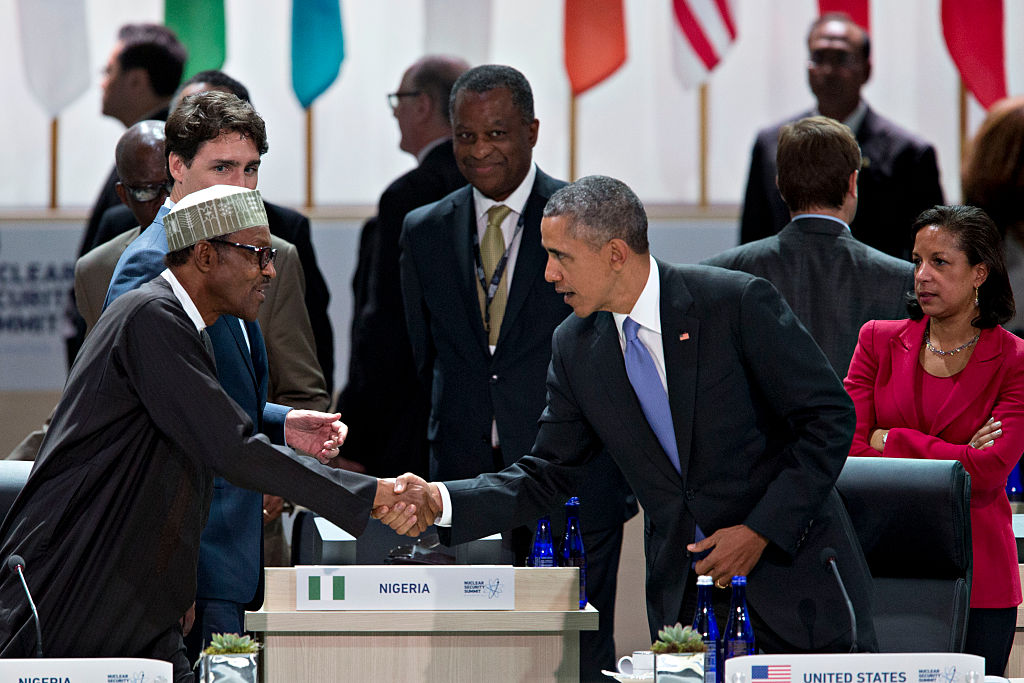So, Who Has Won the Buhari/Obama Debate on Strong Leaders Versus Strong Institutions in Africa?
Many Nigerians would not have forgotten the sharp exchange on ‘Strong leader Versus Strong Institutions’ between Barrack Obama, then US president and Muhammadu Buhari, then a presidential aspirant. Obama, a sitting US president with African blood was visiting Ghana, otherwise the Black star and a Black African reference point in the politics of nation building in Africa when one recalls Kwame Nkrumah. In what appears an obvious reference or even attack on the Nkrumah symbolism, Obama went on to say that Africa did not need strong leaders but strong institutions to get out of the developmental mess it finds itself. Obama immediately provoked thoughts. Was this home truth or insensitivity from an African son?

Nkrumah on the cover of Time magazine
Some people argued that Obama could not but have set out to criticise Nkrumah as a signifier of what has become known as one man personal rule syndromatic of the one-party state and its successor in military dictatorship. In most cases, they produced the phenomenon of one man becoming the father of the nation – the care taker, the guardian and the chief servant. However, one after the other, the ‘Father of the Nation’ became its chief rapist, the epitome of corruption, chief human rights violator and chief promoter of Machiavellian politics, all of which are far from the required politics of modernisation, in whatever way understood. Their worry is with Obama implying the classification of Nkrumah in this mould. There were, however, those who felt Obama spoke well, citing how strong institutions such as the civil service and the military saved Nigeria from disintegration after experiencing a violent shock therapy in the mid 1960s.
But there was one man who saw things differently and spoke up. He is Muhammadu Buhari, current Nigerian president but who was then a Nigerian presidential aspirant. Although he did not disagree with Obama fundamentally, he reformulated Obama substantially. In the Western world, he said, strong men emerged to build the strong institutions those societies rely on today. Africa is, therefore, in need of the strong men who would build strong institutions in the first case. For the two men, it is a binary view of the structure-agency debate or the individual versus the system dichotomy. For Obama, structure or the system is the most important. For Buhari, the opposite is the case. Each understood the question from a culturally specific standpoint, with Buhari`s being a critique of the Western institutionalist gaze whereby the individual can only fit into the structural flow. But where might the West have got this gaze from? It cannot have come from any other source than the key Western experience of a great infrastructural outlay that followed the industrial revolution as well as the post war reconstruction. The totality of these subsequently made a midget of the individual in the Western mind. This is the exact opposite in the African mind where the Western experience has not been the case and where there is still a big role for agency and, therefore, unique individuals.
 This is the only reason one would find Chinua Achebe and Professor Peter Ekeh together with Buhari on this issue. Achebe’s comes out clearly in his formulation of his thesis of the trouble with Nigeria: “The trouble with Nigeria is simply and squarely a failure of leadership. …The Nigerian problem is the unwillingness or inability of its leaders to rise to the responsibility, to the challenge of personal example which are the hallmarks of true leadership”. That’s how Achebe formulated his argument, meaning that, for him, it is a binary question of the individual and the system and if the individual is weak, then there is a problem.
This is the only reason one would find Chinua Achebe and Professor Peter Ekeh together with Buhari on this issue. Achebe’s comes out clearly in his formulation of his thesis of the trouble with Nigeria: “The trouble with Nigeria is simply and squarely a failure of leadership. …The Nigerian problem is the unwillingness or inability of its leaders to rise to the responsibility, to the challenge of personal example which are the hallmarks of true leadership”. That’s how Achebe formulated his argument, meaning that, for him, it is a binary question of the individual and the system and if the individual is weak, then there is a problem.
If we follow Ekeh, there are two spaces in Africa’s national space- the communal and the civic, each with different logics and dynamics. Thus, although the Yorubas, for instance, have democratic ethos, including how to do away with dictatorial leaders but the strength behind this ethos is intangibly embedded in the Yoruba world. It has not been nationalized. Like the Yorubas, every other kingdoms, emirates, chiefdoms, city states and different polities in Nigeria have their cultural ethos but products of such cultures still fail the leadership test of the civic public once they find themselves at the national level. That makes the question to ask that of why nationalizing the sectional has not been accomplished? Many at this point would say the national question is implicated. Others would say it is because Nigeria has not been allowed to industrialise or its ruling elite have not got a homeland view of capitalism and are still fighting at the level of kingdom, emirates and chiefdom politics. It is thus difficult to find one reason for this.
Does the consensus of Achebe, Ekeh and Ekeh absolve the Buhari reformulation of Obama`s cultural imagination of the question? No, it doesn`t. Beautiful as Buhari`s own formulation look, it carries a baggage: how do we know a strongman who would build strong institutions and those who would not? Interestingly, Buhari came back to this point on his own when he argued in South Africa in 2015 that Obama would not have postulated his thesis of strong institutions if he ever visited Nigeria. His reason is that it was strong men who destroyed strong institutions in the Nigerian case. And he did add how determined his administration is to restore the institutions the British colonial leaders bequeathed to Nigeria. That is the paradox of “may be, another strong Nigerian will come and revive the institutions and make them strong again” that he spoke to in South Africa. The logical implication is that there are good ‘strong leaders` and there are bad ones.
But, as in 2015 when he was speaking in South Africa, General Buhari had transformed to President Buhari. Since then, he has been experimenting with a variant of the African strong leader that has attracted harsh criticism across the country. While only time would conclusively tell whether he is the one making a mistake or the country, his experimentation with the strong leader as the builder has left many in utterly uncomfortable position in terms of existence even as it has given a lie to the idea that there is something like an autonomous private sector in Nigerian political economy. As soon as the Buhari regime centralized government accounts, put speculation on the run, the private sector was nowhere to be seen. If the regime had been clear headed, did not turn out exclusionary in recruitment and had resisted submission to the poorly informed neoliberal hounds in the other room of power, it could have been safe to conclude it is a case study in the good strong leader. Now, such conclusion is difficult to make by even the strongest supporters of the regime.

Ahmed Bola Tinubu and Chief Bisi Akande, mandarins of Nigeria’s ruling party during a recent visit to President Buhari who is on a medical vacation in London
This is more so that the strong man himself is human after all. After a whole month of being on sick leave, President Buhari can be said to be empirically confronting a major limitation of his own theory of the strong leader as the route to strong institutions in Africa. Can such a model still be regarded as helpful if the strong leader is human after all, becoming the purpose of overt and covert London trips by government officials, well wishers and concerned individuals to sympathise with him while ordinary men and women offer prayers for his quick recovery? Who then is the winner and the loser of the Obama-Buhari debate? Who, between Buhari and Obama can be right in this crucial debate on Africa`s future?
The binary view of winners and losers can be a problematic one. Even in the best or worst case scenarios, there are hardly complete winners and complete losers. Although there is a critical sense in which a winner or loser in every scenario can be established, such determination hardly escape the power/knowledge facility. In assessing the debate, therefore, nobody would be pronounced winner or loser as such. Fundamentally, Obama is right to emphasise strong institutions just as Buhari is equally right in arguing that it was strong men who built strong institutions in the West. Buhari is additionally right to insist on a distinction between right strong leaders and wrong strong leaders. The problem that crowds the debate is the question of what strong institutions mean? We have seen that there is no universal sense of this without it being hegemonic. We are also seeing how the theory of strong institutions as a derivative of `good` strong leader can run into a hitch if, like in Nigeria now, the strong leader has had to be away for a whole month on a medical vacation, just two years into a plausible eight year tenure. Doesn’t this make Buhari’s thesis of hanging strong institutions on strong leaders weak or untenable?

A Newsweek magazine graphic showing Vladimir Putin and Donald Trump pingponging
These are all relevant questions for a country such as Nigeria which has been profiled to be “perpetually potentially great, almost permanently in crisis, regularly threatened with disintegration, prolongingly devoid of democracy, and economically plundered and mismanaged, forever talking about democracy but forever retreating from democracy”. It needs to look at the debate from a more critical gaze beyond the sense that constitutes the individual and the system as separate categories. The structure and the individual are not mutually exclusive. They interact and the dynamics on the ground determine where the strong leader can counter-balance the system and vice-versa. After all, isn’t Vladimir Putin substantially counter-balancing the system in Russia now? And isn’t Donald Trump on that course now in the United States now? How far each can go will depend on the balance of interests in each of the two polities. So, framing the question as `strong leaders versus strong institutions` was wrong in the first case. It should have been `strong leaders-strong institutions nexus’ or something of that nature.




























